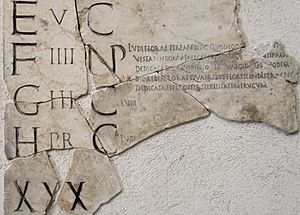Verrius Flaccus facts for kids
Marcus Verrius Flaccus (born around 55 BC—died around AD 20) was a famous Roman teacher and expert in grammar. He lived and worked during the time of the Roman emperors Augustus and Tiberius.
Life of a Roman Teacher
Marcus Verrius Flaccus was a freedman. This means he was once a slave but gained his freedom. He became very well-known for his excellent teaching methods.
His reputation was so great that he was asked to teach Gaius and Lucius. These boys were the grandsons of Emperor Augustus. Flaccus moved to the imperial court with all his students. His pay was greatly increased. However, there was one rule: he could not take on any new students.
Flaccus lived to be very old. He passed away during the rule of Emperor Tiberius. A statue was built in his honor at a place called Praeneste. This statue was placed in a special marble spot. It had writings from his famous calendar, the Fasti Praenestini.
Flaccus's Important Works
Flaccus was also a brilliant scholar who studied language and ancient history. His most important book was called De verborum significatu. This was the very first major dictionary in Latin that was organized from A to Z.
Only small parts of his original dictionary still exist today. However, it was used as the main source for another book. This later book was a shorter version written by Sextus Pompeius Festus. It was also called De verborum significatu. Even centuries later, Festus's book was shortened again by a writer named Paul the Deacon. This shorter version was made for the library of Charlemagne.
Flaccus also created a calendar of Roman festivals. It was called the Fasti Praenestini. This calendar was carved into marble. It was set up in the public square (forum) in Praeneste. Some pieces of this marble calendar were found in 1771. More pieces were found later, adding to the collection.
Flaccus wrote other books that are now lost. These include:
- De Orthographia: De Obscuris Catonis: This book helped explain difficult parts in the writings of Cato the Elder.
- Saturnus: This book discussed questions about Roman religious practices.
- Rerum memoria dignarum libri: This was a huge encyclopedia. Pliny the Elder used it a lot for his own writings.
- Res Etruscae: This book was probably about augury, which was a way Romans tried to predict the future.
See also
 In Spanish: Marco Verrio Flaco para niños
In Spanish: Marco Verrio Flaco para niños
- Quintus Caecilius Epirota
 | Victor J. Glover |
 | Yvonne Cagle |
 | Jeanette Epps |
 | Bernard A. Harris Jr. |


